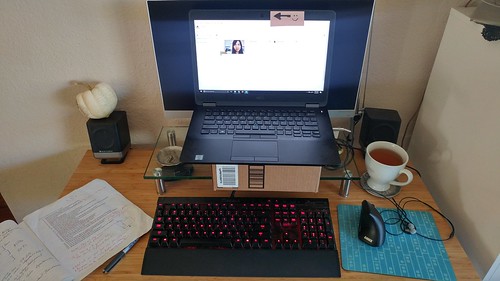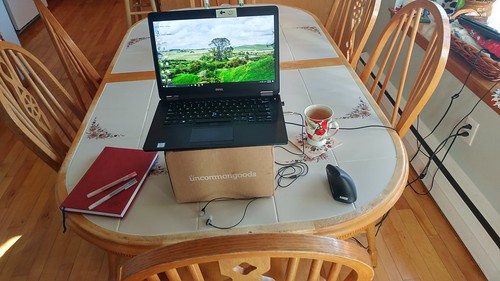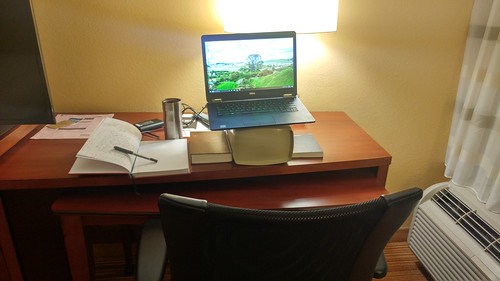Wednesday, January 4, 2017

As of writing, I've done 11 remote interviews (out of ~30 applications), turned into ~8 on-campus interview invitations, as part of the faculty job search. I've learned some things about myself. (1) I do terribly at phone interviews, but not so bad when video's involved, and (2) 15 minute time limits to the interview really messes with the conversational flow. If anyone has figured out how to do well on a 15 minute phone interview, please let me know, because they're rough.
The Professor Is In has a post on rocking the phone/Skype interview. That's a good place to start. As well as a more general post on academic interview facepalms and an entire post on the question I was asked in every interview. Here's another list of questions from someone in a similar field, full of questions he asked and got asked. Also, this Chronicle of Higher Ed article on Skype/Video interviews specifically. Janet Davis' Tips for the Application Process for Teaching-Oriented Positions is pretty good for the interview section as well. ...Or, do a Google search?
Anyways. If your application materials pass muster, you may be invited to do a remote interview. On a phone. On Skype. On some other web video platform, who knows! Once you get the remote interview, your application materials no longer matter and then all the pressure is on your live-interview performance. Not every school does a remote interview, some skip straight to the on-campus. Although, pretty much every liberal arts college does a remote interview.
Some key tips to handle this remote interview:
- My goal in every remote interview is to get them to laugh. Remote interviewing can be painful for a search committee with a bunch of them in a row.
- Wear a button-down (i.e., look presentable).
- Have some institution-specific questions to ask. Two should be enough, do some homework!
- Prepare answers to a bunch of different potential interview questions.
- Set-up your physical space for success (i.e., eye contact).
- Think about how to wrap up your questions.
- Write thank you emails to everyone on the call afterward.
Institution-Specific Questions
As far as questions to ask the search committee I tended to veer towards:- Look up something unique to the school, and generate a couple different questions prior to the interview. Start with senior projects, independent study, winter term, common course all students take, etc. and ask a question about it. Aim for 2 institution-specific questions, at least.
- Is there a grants office? A teaching & learning center? Do faculty use it? What's it like to work with them? (Shows interest in teaching/research)
- What does collaboration look like at ____? Mostly external? Does the school fund internal projects? Who do you collaborate with?
- Teaching load? Research expectations for tenure? (Be careful with these).
- What role are you looking to fill with this position? How does this fit in with longer term departmental goals?
- (liberal arts)What do you think drives students at _____ to pursue computer science? Where do they end up afterwards?
- (liberal arts)What would you say is the most distinguishing feature of your institution that sets you apart from your peer institutions? (be careful with this one!)
Think about how you'll finish with your questions. "I have no more questions" isn't going to cut it. Something along the lines of "I could ask questions all day, but I don't want to take up any more of your time. Who should I direct future questions to?" may work. Plan it out in advance.
Prepare Your Answers to Interview Questions
I've gathered a bunch of sample interview questions at the bottom of this post, from all over the Internets. But here's a few questions I was asked repeatedly.- Summarize your research.
- What classes are you willing/able/excited to teach?
- (liberal arts) Why would you be a good fit for a liberal arts college? (or more generally, why would you be a good fit here?)
- Why are you a good fit for this department?

Setting Up The Physical Space
- You want to look your interviewers in the eye. Set your web camera to eye-level. I often use a cardboard box, or if I'm in a hotel room I might use a trashcan buoyed by hotel Bibles.
- Also on looking your interviewers in the eye: Look at the webcam. I use a post-it note with arrow pointing to camera. Does this mean you actually don't see the people on your monitor? Yes, it does, but the sacrifice is worth it.
- Earbuds for better hearing, I only use one earbud so I can modulate the volume of my voice better
- Paper & pen to record who is in the interview, for thank you emails later.
- Your list of researched questions (and general ones) to ask the committee.
- Try to ensure you're in a quiet space with a reasonable background, and no one walking around behind you!!! I have, however, had conversations about my cat making an appearance on the couch behind me and been given an on-campus interview anyways!

Thank You Emails
There are better resources around for writing thank you notes to the people you spoke with. But in short, they don't have to be long and they won't really make or break you. Just thank them for their time, mention why you enjoyed the conversation, and maybe why you might be a good fit. End with a "I look forward to hearing from you." You can send copies of the same thank you to multiple people at multiple institutions, but I prefer to customize a tiny bit if at all possible.Practice Questions
Here's a nice random sampling of potential interview questions to be asked and to ask yourself. Maybe you'll find some you like? I have the higher priority questions discussed above, but part of your preparation should include writing out the answers to all these questions and then reading them aloud to yourself several times.Questions For You (be brief and to the point!!!)
1. What is your approach to teaching an introductory course in your discipline?
2. How would you aim to get students who might have no background in that discipline interested in it?
3. What text have you used in a previous course that did not work well?
4. What is the one text that you think you would nearly always want to include in an intro course?
5. What text would you nearly always include in an upper-level course in your area of specialization?
6. How do you understand the role of academic adviser?
7. How does your research inform your teaching, and vice versa?
8. What ideas do you have for generating excitement about your discipline across campus?
9. What do you think are the primary characteristics of an excellent undergraduate program in your discipline?
10. If you could teach anything, what is your dream course?
11. What is the benefit of studying your discipline even if a student decides to major in something else?
12. Tell us about your research program.
13. What classes taught or comfortable teaching, type, former responsibilities
14. Past, present, future research; know what is cutting-edge in your area of expertise
15. Why that college/university/position
16. How is your dissertation different from other work in your field?
17. What are your publication plans arising from the dissertation?
18. Who are the biggest scholarly influences on your work?
19. How would you teach a large intro class in your/our discipline?
20. Which textbook would you use for that class?
21. Can you name 3 classes that you would be interested to teach for us? Why?
22. How do you see your work fitting into our department?
23. How would you teach a foundational theory/methods graduate seminar?
24. What do you think the most important intellectual debate is in your/our field?
25. Can you envision any collaborations with faculty currently in the department?
26. What inspires your teaching?
27. We notice you were trained at a large public institution; how do you feel you'll fit in at a small liberal arts institution like ours? (and variations on this theme)
28. What is the most significant piece of research that you have read in the last year?
29. What do you envision for creating a research program here?
30. Do you plan to apply for research funding?
31. What is the funding record of your field?
32. We have a large teaching load here – 3 classes a term. How would you manage this and still stay productive in research and writing? Your current research requires more technological support than this institution is able to provide. How will you deal with this?
33. We see that you have done a lot of conference papers and presentations; we have limited research funding here to support that kind of travel. How will you adapt to that?
Questions To Ask Them
1. Departmental goals in next 3-5 years (unless on website)
2. How they see you fitting in their plans
3. Greatest strengths of this university/students/department
4. Tenure process
5. How is teaching evaluated?
6. Support for undergraduates at research conferences?
7. What's the relative importance of teaching, research and service for tenure?
8. About what percent of faculty receive tenure?
9. Tell me about your student population.
10. Where do the undergraduate students go after graduation?
11. What kinds of technology are available in the classroom?
12. How well does the library meet departmental needs?
13. What courses are you looking to fill?
14. How does the department and university support the improvement of teaching?
15. What resources for research are available within the department (e.g., computer facilities, equipment)
16. Is there a research office on campus to help faculty write grants?
17. What kinds of financial support are available for research and supplies?
18. Is outside grant support essential for promotion and tenure?
19. How are graduate students supported?
20. How do graduate students select research advisors?
21. Can grants be used to supplement salary?
22. What type of retirement program is there? What percentage of the salary goes to retirement? What does the school contribute?
23. What type of health program exists? What are the costs and benefits?
24. How many undergraduate and graduate students are presently in the department?
25. How are their numbers changing?
BYOV Posts on the Faculty Job Search
- Overview of the Assistant Professor Job Search
- Applying for Academic Positions
- Remote Interviews
- Packing for On-Campus Interviews
- On-Campus Interview Lessons Learned
- Sample Assistant Professor Job Hunt Timeline
- Reflections on Negotiation
- Descriptive Statistics of my Job Search
- Deciding Research or Liberal Arts






0 comments:
Post a Comment